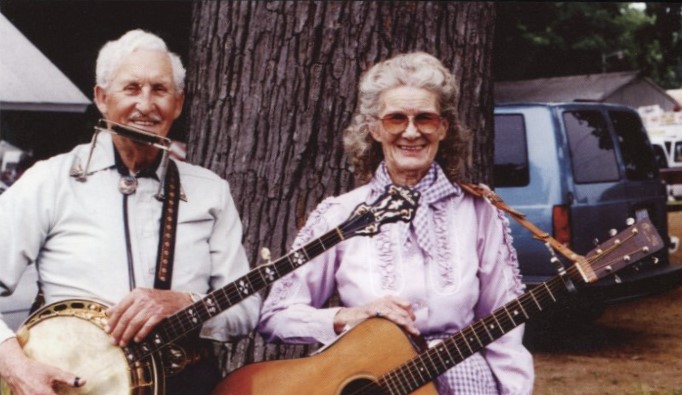Art Form: Appalachian old-time, bluegrass, and gospel music
Location(s): Flint (Genesee County)
Wade and Julia Mainer

Portrait of Wade and Julia Mainer
Wade (1907-2011) and Julia (1919-2015) Mainer did what great folk artists have always done: they received their music from earlier generations, gave it their own special shape and stamp, and passed it on to younger musicians. They played exemplary roles in preserving old-time Appalachian music and hold a special place in southern musical history.
As a fine singer and guitar player, Julia had her own radio program in the 1930s. A deeply religious woman, Julia specialized in gospel songs. In addition to solo work, she served as Wade's guitarist in concerts and on records for almost 40 years. She also sang harmony with him. The pair were married for 74 years.
Wade, a legend of traditional mountain music, grew up in a musical family from birth. He learned to play the banjo, which became his specialty, by watching local musicians at Saturday night barn dances. In the 1930s he began his musical career, joining with his older brother, J. E., to form the string band Mainer's Mountaineers. He soon formed his own group, Sons of the Mountaineers, and continued to record and work in radio until 1953 when he moved to Flint to work for General Motors. Wade's large recorded repertoire in the 1930s served as a bridge between the older mountain music and the Bluegrass style of the 1940s and 1950s. He was one of three musicians who kept the five-string banjo and its old-time repertoire in the public eye through records and the radio until the arrival of musicians such as Earl Scruggs.
During the early 1950s, Wade and Julia gave up musical entertainment, singing only in religious services. Persuaded years later that the banjo and gospel music were compatible, they returned to public performance, and by 1961 had begun to record again. After Wade's retirement in 1973, he and Julia began to perform at bluegrass festivals, concentrating on mountain gospel music with an occasional old and rare secular piece. In 1987 Wade was awarded a National Heritage Fellowship for his role in the development of two-finger banjo picking in the style of his native western North Carolina.





